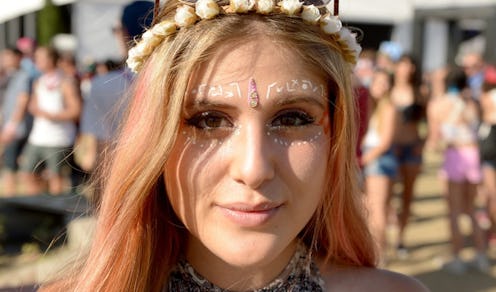Life
How To Not Culturally Appropriate On Halloween This Year

When Halloween rolls around, I have three thoughts on my mind: I can’t wait to go to a haunted house, I want hot apple cider, and I wonder who will have the most viral racist costume this year. Every Halloween is like being stuck in a Twilight Zone, full of endless think pieces on cultural appropriation and explanations as to why certain "costumes" are racist. No matter how many times people of color explain cultural appropriation in regard to Halloween, there is, without a doubt, a white person who wears a culturally appropriated costume at least one of the nights of the holiday. Ugh. America has whitewashed or flat-out erased the history of many marginalized communities, and Halloween costumes are just one glaring example of the way the rich cultural history of non-white people is ignored and erased.
So if an IRL prince or super-rich celebs aren’t above being called out for racist and/or appropriative costumes, neither are your Facebook friends. It may feel like we shouldn't need a guide about how to not culturally appropriate this Halloween, but many people still don't quite understand why it never OK to use people of color’s culture as a costume. If you still need a little help understanding why cultural appropriation is unacceptable, and which costumes may be racist, I've got you covered.
Check out the entire 'What's Up, Boo?' series and other videos on Facebook and the Bustle app across Apple TV, Roku, and Amazon Fire TV.
Someone Else's Skin Is Not A Costume
Sigh. This seems like an obvious point, but every year, no matter how often it is decried, someone (aka, a white person) without a doubt wears blackface for Halloween. (If not blackface, you are bound to find someone in yellowface or brownface.) People of color have explained so many times that dressing up as "black," or as another race for Halloween perpetuates white supremacy. This isn't just a fashion faux-pas, but downright racist. Learn from Julianne Hough's terrible decision, listen to POC, and just don't do this. Remember, when you are able to wash off your Halloween makeup and go right back to being privileged, people of color don't have that option. POC do not get to dress up as "white" and escape racial injustice.
Also, Cultural Traditions Are Not A Costume
When Heidi Klum dressed up as Kali, the Hindu goddess of death, creation, and destruction, she upset many Hindu leaders as well as religious followers who felt Klum disrespected their revered deity. Other cultures' traditions are not any less sacred simply because you don't personally ascribe to that belief system, or because you have a different heritage. (Looking at you, stock-photo-Coachella-white-girl in a Native American headdress!) Repurposing people of color's cultures for your Halloween costume isn't being creative — it's called "Columbusing." Check out the "We're a Culture, Not a Costume" project for more on commonly appropriated costumes.
Learn The History Behind Your Costume Ideas
Ask yourself these questions before dressing up: Is my costume representative of a community's pain and suffering? Does my costume belong to a culture that is not part of my heritage? If the answer is yes to one or both those questions, ditch the costume. The "sexy" Geisha costume is a particularly popular pick in this category. Japanese-American women have openly discussed their negative feelings toward this "costume," sharing that the "sexy Geisha" reinforces racist tropes about Asian women, and fetishizes their culture. But hopefully, this Halloween, people will choose to retire racist and historically inaccurate stereotypes.
Recognize The Difference Between Being "Offended" Versus Being "Triggered"
Oftentimes, when people express disdain for cultural appropriation, it is because it goes beyond being "offensive," and causes an emotional trigger (no, not an internet troll's definition of "trigger"). Racism has been shown to cause post-traumatic stress disorder, and symptoms of PTSD are at times induced by outside stimuli — for example, a person of color with race-related PTSD may be triggered into a panic attack just seeing someone dressed up as Trayvon Martin for Halloween. America has a long history of white supremacy, and our modern day society is far from being racially just. So while POC are inarguably smack dab in the middle of their fight for civil rights, your culturally-appropriated costume makes light of not only those painful struggles, but POC's basic personhood.
Call Out Other White People For Cultural Appropriation
Not challenging your white friends when they're being racist is a form of covert white supremacy, and makes you complicit in their cultural appropriation. Part of your job as an ally is to always call out other white people for racist behavior, despite your own discomfort. So go ahead. Make sure your friends aren't showing up to a Halloween party dressed like an indigenous person, and if they do, you sure as hell better let them know why it's wrong.
The more everyone continues speaking about cultural appropriation, the less appropriative Halloween costumes we will see. It's 2017: We have more than enough diverse comic book universes, movie characters, and IG Halloween makeup tutorials to not culturally appropriate our costumes.